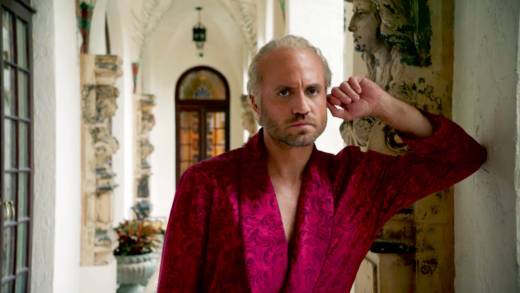Of course, the "true" in the "true crime" genre always rests on conjecture, and the demands of a solid narrative arc. That was certainly the case with American Crime Story's first season, which was largely based on Jeffrey Toobin's book, The Run of His Life: The People vs. O.J. Simpson. The new season is based on a 2000 book by Maureen Orth called Vulgar Favors: Andrew Cunanan, Gianni Versace, and the Largest Failed Manhunt in U.S. History — but it feels fundamentally different, and far more invasive, than the O.J. season. You likely won't get through all nine episodes (the first eight of which have been offered to critics) without chafing against the liberties the series so eagerly takes — for me, it was a long car ride in episode four, involving tense discussions between Cunanan (Darren Criss) and a former lover (Cody Fern) that clanged the loudest alarm bells.
Disparate Threads
But while the Cunanan murder-spree story predominates, other themes and storylines do recur, though they get far less screentime. Your enjoyment of The Assassination of Gianni Versace will depend on your personal investment in each.
If you come for the Versace stuff shown in the ad campaign — the mansion, the fashion, Penelope Cruz's thick-as-burrata accent as the imperious Donatella, the over-the-top camp of it all — know that the series parcels that stuff out sparingly. Sure, you'll get the (incredibly well-cast) Edgar Ramirez as Versace, purring sexily about what his clothes mean, and Cruz cutting Ricky Martin's Antonio down to size. (Cruz is particularly fun, here — watch the way she sweeps into a room, instantly notices a small tchotchke that a detective had ever-so-slightly re-positioned, and wordlessly nudges it back to starting position.) In episode three, you get Judith Light playing the kind of steely matron that Hollywood casting agents probably call "the Judith Light part" by now. Even the great Terry Sweeney, who brought Nancy Reagan to such fiercely vivid life during his tenure as an SNL castmember, shows up. So yes, the campy stuff is present, clearly, but not nearly to the degree that many will expect.
If you're looking for the series to wrestle with cultural issues, like the O.J. season did with race in America, there's some of that here, too: The story of Andrew Cunanan's life plays out against a backdrop of the struggle for gay rights. Detectives express incomprehension and outright disgust at various victims' homosexuality. An entire episode revolves around the military's "Don't Ask, Don't Tell" policy. Cunanan hides his sexuality from his family and friends. The fact that same-sex marriage isn't yet a possibility plays a role in two of Cunanan's five murders, according to the series. (See above, in re: liberties taken.)
But if you're interested in the tick-tock of it all — the logistics of the cross-country hunt for Cunanan — you'll likely come away disappointed. The series spends some time with the various detectives tracking Cunanan's movements, but not enough for us to get a clear sense of how close they get, or do not get, to catching him.
And if you're hoping to gain some insight into who Andrew Cunanan was, and why he did what he did — well, that's certainly what the series spends most of its time on, and what it wants you to come away with.
... Eventually.
The structure of the series works against it, in that respect: The first episode depicts Versace's murder, and subsequent episodes work back in time, more or less linearly, tracing the course of his murder spree, and focusing, in the eighth episode, on Cunanan's early life.
As a result, the Cunanan we're introduced to in early episodes just isn't particularly interesting. Darren Criss does what he can, but the script forces him to give us little more than a smooth, unctuous, one-note narcissist. Cunanan lies to everyone, himself included, so when — very gradually, six or seven episodes in — we finally get to see something other than the facade he presents to the world, we'd be forgiven for wondering if it's just another mask.
There are no easy answers, no clear reasons, for Cunanan's actions, but that doesn't keep The Assassination of Gianni Versace from reaching for them. Again and again, characters tell Cunanan that he wants fame without working for it, that he's brilliant but lazy. The world is full of such people, but only Cunanan took the bizarre actions he did. When we meet his father in the eighth episode — also, according to the series, an abusive dissembler — it presents us with a collection of what it thinks are revelations, keys that will unlock the secret of Andrew Cunanan. But they're so pat and familiar that, even if accurate — a not inconsiderable if — they can't help but read as conventional biopic fare.

9(MDAxOTAwOTE4MDEyMTkxMDAzNjczZDljZA004))

